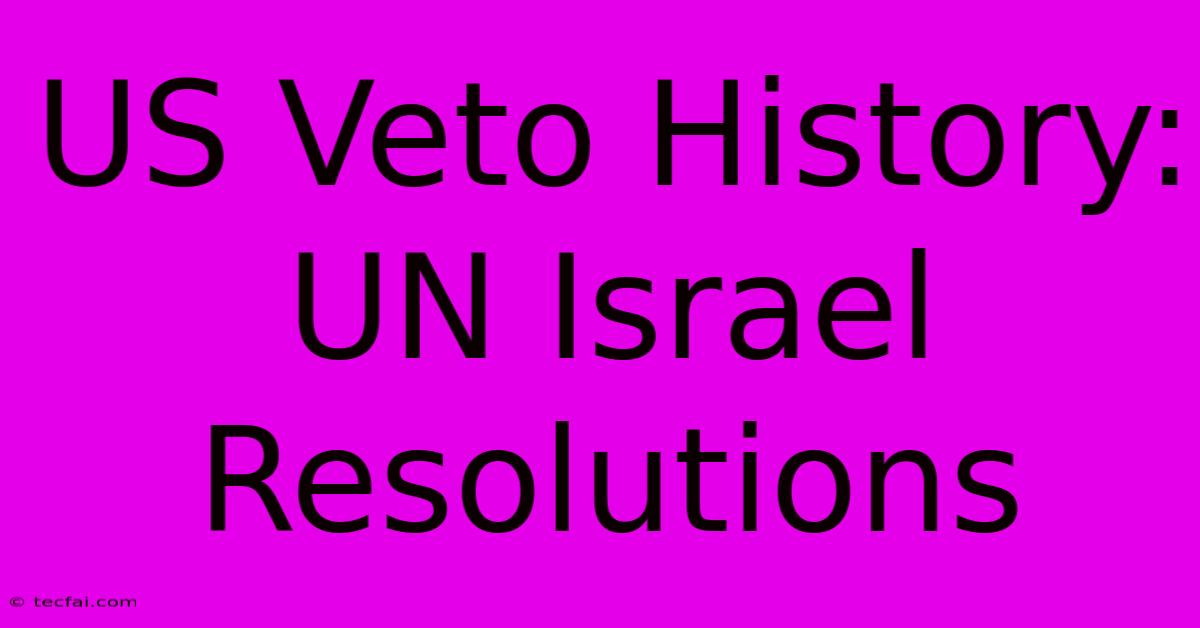US Veto History: UN Israel Resolutions

Discover more detailed and exciting information on our website. Click the link below to start your adventure: Visit Best Website tecfai.com. Don't miss out!
Table of Contents
US Veto History: UN Israel Resolutions – A Complex Relationship
The relationship between the United States and Israel has been a cornerstone of American foreign policy for decades. This relationship is often reflected, and sometimes strained, in the context of the United Nations, particularly regarding resolutions concerning Israel. Understanding the history of US vetoes on UN resolutions related to Israel provides crucial insight into this complex dynamic.
The Power of the Veto: Shaping the Narrative
The UN Security Council's power to maintain international peace and security is significantly influenced by the veto power held by its five permanent members: the US, UK, France, Russia, and China. This veto allows any of these nations to block the adoption of a resolution, even if the other fourteen members vote in favor. The US has utilized this veto power extensively regarding resolutions critical of Israel, shaping the international narrative surrounding the Israeli-Palestinian conflict.
Understanding the Context: A History of Conflict
Before delving into specific vetoes, it's crucial to understand the historical context. The Israeli-Palestinian conflict is a deeply rooted and multifaceted issue with a long history of violence, displacement, and unresolved territorial disputes. The UN has played a significant role in attempting to mediate the conflict, passing numerous resolutions aimed at promoting peace and addressing human rights concerns. However, many of these resolutions have faced US vetoes, often citing concerns about bias or the potential for undermining Israel's security.
Notable Instances of US Vetoes on Israel-Related Resolutions
The US has employed its veto power on numerous occasions to block UN resolutions deemed detrimental to Israel's interests. While a comprehensive list is beyond the scope of this article, some key examples highlight the complexity of the issue:
Resolutions Condemning Israeli Settlements:
The construction of Israeli settlements in the occupied Palestinian territories has been a major point of contention. Numerous resolutions condemning these settlements have been vetoed by the US, often with the justification that such resolutions are counterproductive to peace negotiations and unfairly target Israel. This stance has faced significant international criticism, with many arguing that the settlements violate international law.
Resolutions Related to the Gaza Conflict:
The recurring conflicts in Gaza have resulted in numerous UN resolutions calling for humanitarian aid, ceasefires, and investigations into alleged war crimes. The US has, at times, vetoed or abstained from voting on these resolutions, citing concerns about the resolutions' impartiality or potential impact on Israel's security. The rationale behind these decisions has been frequently debated, particularly regarding the proportionality of force and the protection of Palestinian civilians.
Resolutions Addressing Palestinian Statehood:
Resolutions affirming the establishment of a Palestinian state alongside Israel have also faced US vetoes. While the US officially supports a two-state solution, the specific parameters of such a solution remain highly contentious. The US has often argued that UN resolutions on this issue preempt direct negotiations between the parties.
The Broader Implications: International Relations and Diplomacy
The US's use of the veto in the context of UN resolutions concerning Israel has significant implications for international relations and diplomacy. Critics argue that it undermines the UN's authority and credibility, while supporters contend that it's a necessary safeguard for protecting a key strategic ally. This ongoing debate highlights the challenges of balancing the interests of different parties within the international system and the difficulties of finding a just and lasting resolution to the Israeli-Palestinian conflict.
Conclusion: A Continuing Debate
The history of US vetoes on UN resolutions concerning Israel reflects the deeply complex and often fraught relationship between the two nations. While the US has consistently expressed its support for a two-state solution and a secure Israel, its use of the veto highlights the significant challenges in navigating the intricacies of this conflict within the framework of international law and diplomacy. Understanding this history is crucial for comprehending the ongoing debates surrounding the Israeli-Palestinian conflict and the role of the United Nations in seeking a peaceful resolution.

Thank you for visiting our website wich cover about US Veto History: UN Israel Resolutions. We hope the information provided has been useful to you. Feel free to contact us if you have any questions or need further assistance. See you next time and dont miss to bookmark.
Featured Posts
-
Nfl Monday Night Ravens Chargers Channel
Nov 26, 2024
-
Jon Benet Doc Director Admits Falling For It
Nov 26, 2024
-
Green Mps Tribute To Nikki Kaye
Nov 26, 2024
-
Kings Nabigo Nets Nanalo
Nov 26, 2024
-
Remembering Barbara Taylor Bradford
Nov 26, 2024
